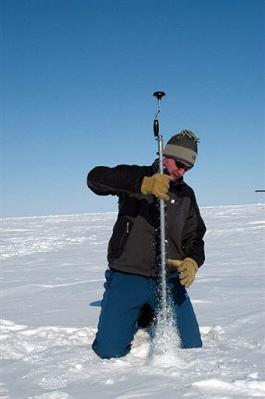Autumn temperatures in the Arctic region are a record 5.0 degree Celsius (9.0 Fahrenheit) higher than normal due the melting of the ice cap, a National Oceanic and Atmospheric Administration (NOAA) report said Friday.
"Changes in the Arctic show a domino effect from multiple causes more clearly than in other regions," said NOAA oceanographer James Overland, lead author of the report titled 'The Arctic Report Card 2008' published on NOAA's website.
 |
|
This handout photo shows Dr. Luke Copland from the University of Ottawa, drilling a hole to install an air temperature sensor on the Ayles Ice Island in 2007. [Agencies]? |
"It's a sensitive system and often reflects changes in relatively fast and dramatic ways," the scientist said.
As the ice cap over the Arctic melts due to global warming, more ocean water is exposed and heated by the sun's rays, the report said.
The warmer air and ocean water affect animal and plant life in the region and melt the permanent ice shelf, which in recent years has shrunk by some 38 cubic kilometers (9.1 cubic miles) and is the leading cause of the global rise of sea levels.
2007 was the warmest year on record in the Arctic region, followed closely by 2008. This continues a general Arctic-wide warming trend that began in the mid-1960s.
The Arctic Report Card is a NOAA initiative begun in 2006 to monitor evolving conditions in the Arctic region, including the atmosphere, sea ice, ocean water, animal and plant life, Greenland, and the general land mass.
In the 2008 report, atmosphere, sea ice and Greenland are coded red, indicating that the changes are strongly attributed to warming. Three other areas – biology, ocean and land mass are coded yellow, indicating mixed signals.
In the 2007 report two areas were coded red – atmosphere and sea ice, and the remaining four yellow.
This year, for the first time a scientific expedition was able to navigate the fabled Northwest Passage linking the Atlantic and the Pacific oceans along Arctic waters bordering Russia and North America because they were free of ice, the German institute Alfred Wegener announced Friday.
"The scientific research vessel Polarstern returned this morning from the Arctic to Bremerhaven (northern Germany). It was the first ship to have crossed the Northwest and Northeast passages" without having to break any ice, an institute spokesman told AFP.
The Arctic ice cap, which in August saw its largest seasonal melting since satellite observations began 30 years ago, completely disappeared in the Northwest and Northeast passages in September, the European Space Agency confirmed on October 7.
(Agencies via China Daily?October 18, 2008)